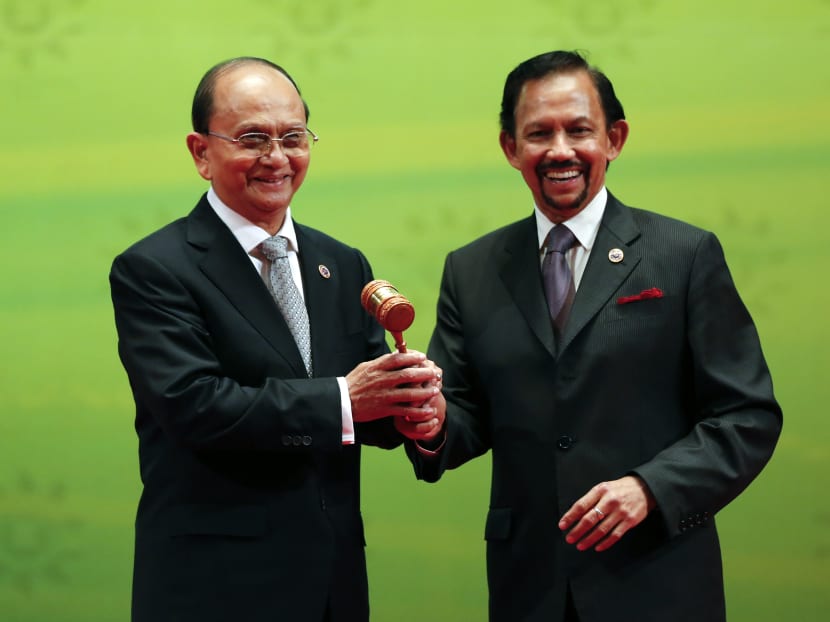Myanmar, once a pariah state, now regional leader
BANDAR SERI BEGAWAN (Brunei) — Myanmar pledged today (Oct 10) to remove the remaining obstacles in its democratic transformation as it assumed the high-profile role of leading the 10-member Association of Southeast Asian Nations (ASEAN).

Brunei Sultan Hassanal Bolkiah (right) hand over the ASEAN Chairmanship to Myanmar President Thein Sein at the end of the ASEAN Summit in Bandar Seri Begawan, Brunei, Thursday, Oct 10, 2013. Photo: AP
BANDAR SERI BEGAWAN (Brunei) — Myanmar pledged today (Oct 10) to remove the remaining obstacles in its democratic transformation as it assumed the high-profile role of leading the 10-member Association of Southeast Asian Nations (ASEAN).
Brunei’s leader, Sultan Hassanal Bolkiah, this year’s outgoing ASEAN chairman, handed a wooden gavel to Myanmar President Thein Sein in a ceremony in Brunei’s capital marking the formerly military-ruled nation’s assumption of the role. Its duties as ASEAN leader will begin next year.
Although Myanmar has embarked on democratic reforms, critics have said rewarding it with such a key role is premature because of remaining problems, including the government’s failure to control deadly sectarian violence.
“From a human rights perspective, the chairmanship is an honour the government hasn’t earned,” said Mr Matthew Smith, a Myanmar expert who directs the advocacy group Fortify Rights.
United Nations Secretary-General Ban Ki-moon, who was in Brunei to meet ASEAN heads of state at the group’s annual summit, said the United Nations (UN) supports Myanmar’s new role but urged it to do more to end bloody communal violence.
“We have seen remarkable progress in their participatory democratic transition but we are also concerned that there are still many more challenges, particularly communal violence,” he told reporters.
Myanmar, a predominantly Buddhist nation of 60 million, has been undergoing unprecedented political transformation after a half-century of harsh military rule.
But greater freedoms of expression have had a dark side, exposing deep-seated hatred toward Muslims that, fuelled by radical Buddhist monks, has triggered attacks first in western Rakhine state, then from Meikhtila in the country’s centre to Lashio near the Chinese border.
Myanmar has also been prodded to release its remaining political prisoners.
Fellow ASEAN member countries welcomed Myanmar’s new role, saying that while issues remain, its collaboration with foreign governments as regional leader would bolster its democratic reforms.
“It can become a huge momentum builder,” Indonesian Foreign Minister Marty Natalegawa said. “Now, at least, there is certain expectations and the attention of the world.”
Myanmar Foreign Minister Wunna Maung Lwin told The Associated Press that his country is determined to address the remaining obstacles to democracy.
“We have so many steps ahead of us but we are determined to overcome all the obstacles to achieve this goal of a democratic society,” he said on the sidelines of the ASEAN summit, which ended today. He did not specify what the obstacles are.
Myanmar, he said, has almost completed preparations for hosting ASEAN meetings next year, and is building hotels that will accommodate the thousands of delegates and journalists who will attend.
Myanmar joined ASEAN in 1997 despite protests from the United States and European governments. AP






